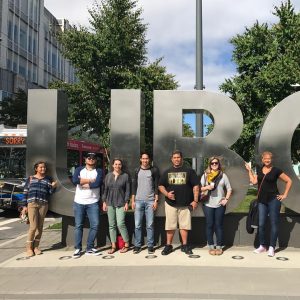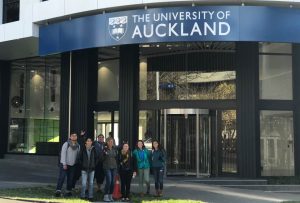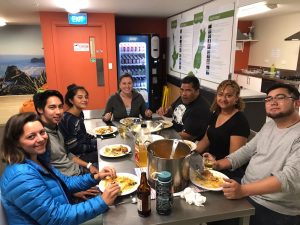News & Events
July 26, 2017
Announcing the 2017 Mahina Cohort
I RARO I TE ATARAU KAROHIROHI: E WHAKATERE HAERE ANA NGĀ WAKA I TE MOANA-NUI-Ā-KIWA
(BY THE SHIMMERING LIGHT OF THE MOON: SEA VESSELS ARE NAVIGATING THE SHARED WATERS AND KNOWLEDGES OF THE PACIFIC OCEAN)
Please join us in welcoming the 2017 Mahina cohort. The Mahina International Indigenous Health Research Training Program is a partnership among the University of Washington, University of Auckland and University of Hawai’i. Mahina is a five year project funded by the National Institute on Minority Health and Health Disparities T37MD008625-01 and is housed at IWRI under the direction of Co-Principal Investigators Drs. Karina Walters PhD, MSW (Choctaw), Tessa Evans-Campbell PhD, MSW (Snohomish) and Co-Investigator Dr. Bonnie Duran, DrPH (Opelousas/Coushatta).

Mahina trainees at the NAISA Confernence in Vancouver, BC
These students will embark on a transformative journey of a lifetime: a fully funded comprehensive health research training experience developed by and for Indigenous scholars. This ten-week journey began on June 15, 2017 when students traveled to Stillaguamish territory (in northwest Washington state) to witnesses a log dedication. The log, donated by the National Forest Service, will be carved using tr
aditional methods and then gifted to the nearby Sauk-Suiattle Tribe. As this log began its journey to become a canoe, these students also began their educational journey to become research scientists. Next, the trainees met up with their University of Hawaii counterparts to attend the Native American and Indigenous Studies Association Conference (NAISA) in Vancouver, B.C.. There they learned about decolonizing health research methodologies, and the issues associated with reproductive health, disease prevention and suicide prevention. They are currently in Auckland, New Zealand where they are settling into their internships for the remainder of (the Northern Hemisphere) summer.
Our 2017 Mahina Cohort
Lauren White (Choctaw): MPH student, University of Washington
Halito. I am a member of the Choctaw Nation of Oklahoma and was born and raised in rural southeastern Oklahoma. I am currently pursuing a Master’s of Public Health in the UW Epidemiology program, where I am learning study design and biostatistics. I am interested in the social and environmental determinants of health and the concepts of community, identity, and belief, and how these shape mental wellness and affect mental health outcomes and common comorbidities in rural and Indigenous communities. In addition, I am especially interested in learning to apply Indigenous methodologies and develop projects, which center Indigenous culture for their theoretical basis. Shortly after completion of the Mahina program, I will be applying for PhD programs, which emphasize public health research. I should also tell you that I have conducted much fieldwork in lizard behavior and I have worked many summers as a wildland firefighter.

Mahina trainees at the University of Auckland
Jo Ann Tuifanu (Native Hawaiian and Samoan): BA in social work, University of Hawaii
Aloha. I was born in Honolulu on the island of O’ahu. I am interested in researching community mental health and Native Hawaiian approaches to community-based treatment. My hope is that by researching the connection to the land and practicing culture will reduce recidivism and maintain wellbeing for our people. I plan to get my master’s degree in social work.
Sai Furukawa (Native Hawaiian): BS in biochemistry with honors, University of Hawaii
Aloha. I was born and raised on Maui, and have lived through the fight for water between Native Hawaiians and businessmen. This serves as a catalyst for my interest in researching the social, cultural, and historical determinants of indigenous health, and indigenous research ethics and protocols. I volunteered with ‘Aha Kāne, a Native Hawaiian organization that advocates for Native Hawaiian men to fill their roles and responsibilities. I am also studying Lā‘au Lapa‘au and am interested in continuing research in this area as well. I plan to go to medical school to pursue my research interests and to become a surgeon serving Maui.
Hoʻoleia Kaʻeo (Native Hawaiian): Dual major in biology and Hawaiian language, University of Hawaii
Aloha. I am from Waiohuli on the island of Maui. My research interest is to examine the relationship between the ʻāina (land) and socioeconomic, political, historical, cultural, and environmental determinants of health for Native Hawaiians. I want to incorporate our cultural teachings, stories and language into this research on Native Hawaiian wellbeing. I plan to pursue a graduate degree in Native Hawaiian health.
Shelby Koch (Choctaw): Dual major in biology and anthropology, Western Washington University
Halito, I am a member of the Choctaw Nation and grew up in rural Eastern Washington. I am a senior at Western Washington University majoring in biology/anthropology, and I am completing prerequisites for medical school. After the Mahina program, but before medical school, I plan to pursue a master’s degree in Native American studies in Oklahoma. My ultimate goal is to become a physician and researcher working for my tribe in Oklahoma. I am interested in researching preventable diseases, such as diabetes and obesity. I am also deeply interested in evolution and how we can use evolutionary medicine to help combat modern epidemics. I am also an avid barefoot trail runner and swimmer and certified lifeguard.

Mahina trainees sharing a meal at their student accommodations in Auckland, New Zealand
Santino Camacho (Chamoru): Dual major in psychology and gender studies, University of Washington
Hafa Adai, I am Chamoru and from the island of Guåhan in the Marianas. I just graduated with a degree in psychology and gender studies from the UW. In fall 2017 I will begin a Masters in Public Health with a focus in behavioral and social sciences. My research interests include the integration of cultural practices into stress coping models and treatment programs for mood and anxiety disorders. I hope to be able to use indigenous knowledge to research and create programs that are low cost and accessible to Pacific Islander and other indigenous communities. My Honors/McNair project studied the categorization of Asian Americans in the racial minority category and their access to academic resources. I have also done qualitative and assessment research on health behaviors for men who have sex with men in an HIV healthcare access study. I also enjoy singing and dancing in my Chamoru community.
Keith-Allen Afong (Native Hawaiian): Majoring in Cultural Resource Management, University of Hawaii
Aloha. I was born and raised in the town of Waimanalo on the east side on the island of Oʻahu. I am interested in researching about and managing Hawaiiʻs cultural resources such as native plants and their medicinal purposes, forests, and oceans. My research interests include proving that Native Hawaiians are great scientists who knew how to utilize natural resources in their ways of life, but also learning how to give back to the ʻāina. I also studied La’au Lapa au, the usage of native Hawaiian plants as medicine. I hope my research lessens health disparities among Native Hawaiians and Pacific Islanders. I plan to pursue a master’s degree in public health to continue my research.




